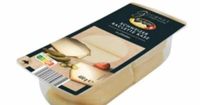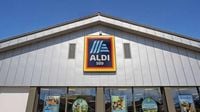Aldi Süd has issued a recall for its "Gourmet Schweizer Raclette Käse" cheese due to potential Listeria contamination, raising health concerns among consumers in parts of Baden-Württemberg and Bavaria. The recall was prompted after Listeria was detected during quality control checks, leading the supplier, Lustenberger & Dürst SA, to take immediate action.
The affected cheese comes in 400-gram packages with best before dates ranging from April 15, 2025, to July 26, 2025. Customers who have purchased this product are advised not to consume it and to return it to any Aldi Süd store for a full refund, even without a receipt. The initial warning regarding this recall was published on May 8, 2025.
Health experts highlight that Listeria monocytogenes, the bacteria responsible for listeriosis, can cause serious gastrointestinal issues. Symptoms may include nausea, vomiting, diarrhea, and flu-like symptoms such as fever and headache. In severe cases, particularly for vulnerable populations, it can lead to more serious conditions like sepsis and meningitis, which can be fatal in approximately 30 percent of cases according to "LADR Biofocus." Pregnant women, newborns, the elderly, and individuals with weakened immune systems are particularly at risk.
According to the Federal Office for Consumer Protection and Food Safety (BVL), Listeria is commonly found in the environment, including soil and water, and can contaminate food products. A concerning aspect of these bacteria is their ability to grow at refrigerator temperatures, making it difficult for consumers to detect their presence through sight or smell.
In light of the current recall, Aldi Süd has acted quickly to remove the affected cheese from its shelves. The company has stated that it is working closely with health authorities to ensure consumer safety. Customers who have purchased the cheese are encouraged to check their refrigerators and return any affected products.
The recall comes amidst a backdrop of food safety challenges, as Listeria contamination is not uncommon in food products. Recently, other retailers, including Lidl, have also faced recalls due to contamination concerns. Aldi Süd, which operates around 1,980 stores in West and South Germany and employs approximately 49,600 people in the country, has emphasized its commitment to consumer safety.
For those who may experience symptoms after consuming the affected cheese, especially pregnant women and individuals with compromised immune systems, it is essential to seek medical attention promptly. While healthy individuals may experience mild symptoms or none at all, listeriosis can have severe consequences for at-risk groups.
Consumers are reminded that proper food safety practices are crucial in preventing Listeria infections. Cooking food thoroughly can eliminate the bacteria, as it is recommended to heat contaminated food to at least 70 degrees Celsius for two minutes to ensure safety.
As the situation develops, Aldi Süd continues to monitor the health implications of this recall and urges its customers to stay informed about food safety issues. The company remains dedicated to maintaining high standards in food quality and safety.
This recall serves as a reminder for consumers to remain vigilant about food safety and to be aware of potential health risks associated with contaminated products. The presence of Listeria in food products underscores the importance of regular quality checks and consumer awareness in ensuring public health.
In summary, the "Gourmet Schweizer Raclette Käse" recall highlights the ongoing challenges in food safety and the need for consumers to be proactive in checking their food products. With the potential risks associated with Listeria, Aldi Süd's swift action aims to protect its customers and prevent any health complications.



